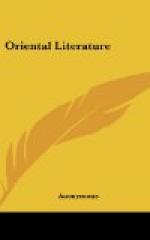[21] The thought contained in these lines, appears
so natural and so
obvious, that one wonders
it did not occur to all who have attempted
to write upon a birthday
or a death.
TO A CAT
Poor Puss is gone! ’Tis fate’s
decree—
Yet I must still her loss
deplore,
For dearer than a child was she,
And ne’er shall I behold
her more.
With many a sad presaging tear
This morn I saw her steal
away,
While she went on without a fear
Except that she should miss
her prey.
I saw her to the dove-house climb,
With cautious feet and slow
she stept
Resolv’d to balance loss of time
By eating faster than she
crept.
Her subtle foes were on the watch,
And mark’d her course,
with fury fraught,
And while she hoped the birds to catch,
An arrow’s point the
huntress caught.
In fancy she had got them all,
And drunk their blood and
suck’d their breath;
Alas! she only got a fall,
And only drank the draught
of death.
Why, why was pigeons’ flesh so nice,
That thoughtless cats should
love it thus?
Hadst thou but liv’d on rats and
mice,
Thou hadst been living still,
poor Puss.
Curst be the taste, howe’er refined,
That prompts us for such joys
to wish,
And curst the dainty where we find
Destruction lurking in the
dish.
Ibn Alalaf Alnaharwany.
AN EPIGRAM UPON EBN NAPHTA-WAH[22]
By the former with ruin and death we are
curst,
In the latter we grieve for the ills of
the first;
And as for the whole, where together they
meet,
It’s a drunkard, a liar, a thief,
and a cheat.
Mohammed Ben Zeid Almotakalam.
[22] Mohammed Ben Arfa, here called Naphta-Wah, was
descended from a
noble family in Khorasan.
He applied himself to study with
indefatigable perseverance,
and was a very voluminous author in
several branches of
literature, but he is chiefly distinguished as
a grammarian. He
died in the year of the Hegira 323.
FIRE[23]
A Riddle.
The loftiest cedars I can eat,
Yet neither paunch nor mouth
have I,
I storm whene’er you give me meat,
Whene’er you give me
drink, I die.
[23] This composition seems a fit supplement to the
preceding one;
notwithstanding its
absurdity, however. It is inserted merely to
show that this mode
of trifling was not unknown to the Orientals.
It is taken from the
Mostatraf, where a great number of similar
productions on various
subjects are preserved.




